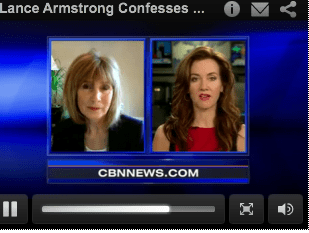 When Lance Armstrong appears on Oprah this week, word is that he admits to doping during his cycling career. What makes his admission so grievous is that he repeatedly denied allegations of doping levied against him for years and went after those who tried to bring out the truth. But my concern is not about what Armstrong will or will not admit to in the church of Oprah. My concern is how we, as Christians, respond to any request for forgiveness. Let’s look at the arguments.
When Lance Armstrong appears on Oprah this week, word is that he admits to doping during his cycling career. What makes his admission so grievous is that he repeatedly denied allegations of doping levied against him for years and went after those who tried to bring out the truth. But my concern is not about what Armstrong will or will not admit to in the church of Oprah. My concern is how we, as Christians, respond to any request for forgiveness. Let’s look at the arguments.
1) Lance has betrayed many people. He doesn’t deserve forgiveness after the way he treated people. True, but biblical forgiveness is not about what a person deserves. Did Javert in Victor Hugo’s Les Miserable deserve the forgiveness of Jean Valjean? No, Javert continued to hunt down Valjean with no resolve to forgive. He was all about the law and making Valjean pay. But Valjean’s forgiveness freed Valjean to be a better person and love. Javert ended up committing suicide.
2) Forgiving Armstrong means condoning or minimizing what he did. False. Forgiveness never does either. It actually recognizes the severity of the breach of trust or betrayal, which is why is it so powerful for the one giving it.
3) Forgiving Armstrong means we let him off the hook. False. He has already lost much. There are natural and spiritual consequences for betrayal. His financial empire is collapsing. His reputation is tarnished and his trophies gone.
4) Once a person asks for forgiveness, reconciliation follows. False. Forgiveness is an act you individually do and reconciliation requires two people. So you can forgive but not reconcile.
5) Once you forgive, things should go back to normal. False. If there is a breach of trust, the person still has to show he or she is repentant. Repentance requires a turning away from the wrong behavior and making a change. For someone to trust again takes time. The person has to repeatedly show he or she was sorry by not returning to that behavior.
6) If a person gets caught and that is what prompts an apology, it is meaningless. False. Your place is not to judge the sincerity of the apology. You are to forgive. Time will show whether the person meant it. God judges the heart. Only he knows if a person really repents. Our job is to accept the apology and still be wise about re-engaging that person given the type of offense.
7) Physically it doesn’t matter if I forgive or not. False. Forgiveness frees you. It has positive benefits to your health. It lowers heart rate and blood pressure and relieves stress.It reduces physical symptoms and helps you sleep, it restores positive feelings not only to the offender but to others, leading a person to more altruistic behavior and charitable work. It lessens depression and lowers your risk of substance abuse.
8) Forgiveness is spiritually commanded, not an option for the believer. True. God forgives us when we don’t deserve it and he expects us to do the same to others. Did people deserve Jesus’ forgiveness on the cross? Yet He gave it. And God tells us that if we don’t forgive, He won’t either. This doesn’t mean that your feelings will be in line with the choice to forgive. Feelings take longer to work through and trust is an issue impacted by lying or breach of trust.
I also spoke to CBN News about this topic. Here is the link to that interview. There is a set up piece about Amrstrong and then the live interview”



